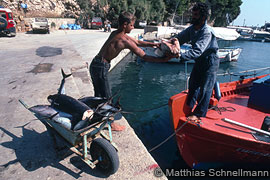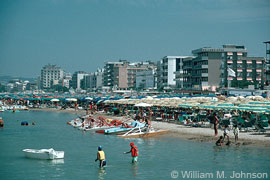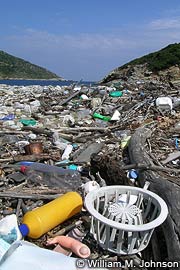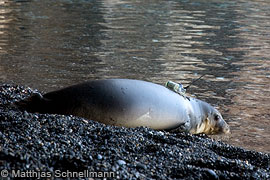

 |
||
 |
||
Vol. 10 (1): June 2007 |
||
Mediterranean: Making A Blue Sea GreenWilliam M. Johnson
The Mediterranean. It has been used by humans as a food source, a means of travel and transport, an inspiration for art and poetry, and probably as a watery playground, too, since time immemorial. Long before Homer even imagined the wine dark sea, fish were being caught with bone or bronze hooks, or with nets made of flax or hemp. For centuries, sponge divers pursued their risky trade from steep shores or from simple wooden boats. Merchants plied the Mediterranean’s burgeoning trade routes, the holds of their vessels carrying everything from sacks of spice and amphorae of wine or purple dye, to salted fish and chests of gold and silver coin. In a sense, one might say that the uses that the sea is put to today have not changed drastically in purpose since Egyptian or Phoenician times – only the intensity, flavour and impact of that exploitation has changed with the modern world.
|
 |
|
|
Tuna brought ashore by traditional fishermen in the National Marine Park of Alonissos, Northern Sporades, in Greece. |
This intense industrialisation of the Mediterranean tuna fishery has hit traditional tuna fishermen hardest, particularly because of the expansion of tuna farming – the practice of trapping tuna schools in purse seine nets and fattening them in cages before killing and freezing.
Despite belatedly appearing on the political radar in Europe, there have been few serious attempts as yet to preserve fish stocks with measures that have a proven track record elsewhere, such as the establishment of no-fishing zones, and the protection of fish spawning grounds.
In New Zealand, by contrast, fisheries authorities and growing ranks of the fishing industry itself are coming to realise the tangible and long-term benefits of setting aside multiple no-fishing zones. At one zone, reports National Geographic, “former skeptics are now some of the reserve’s staunchest defenders. They refer to it as ‘our reserve’ and act as minutemen, reporting poachers and boundary cheats. Spillover and larval export – the drifting of millions of eggs and larvae beyond the reserve – have become central concepts of marine conservation. Reserves where fishing is banned are now seen as potential stud farms and fish hatcheries, replenishing the surrounding areas.”
|
“At least one quarter of marine fish stocks are overharvested. • The quantity of fish caught by humans increased until the 1980s but is now declining because of the shortage of stocks. • In some sea areas, the total weight of fish available to be captured is less than a hundredth of that caught before the onset of industrial fishing.”
|
With the political and economic clout it wields, industrial overfishing also has impacts far beyond the stretches of coast where it lays mile upon mile of nets and lines. In areas of Greece and Turkey, for example, the industry has long been accused of endangering the livelihoods of traditional coastal fishermen by depleting fish stocks and damaging spawning grounds.
In a vicious circle, reduced catches have stoked the anger that the coastal fishermen feel towards Europe’s most endangered marine mammal – the Mediterranean monk seal, sometimes with lethal consequences. In Greece, direct killing by fishermen is still considered the most serious mortality factor affecting the species. It is also speculated by some that depleted fishing grounds are driving hungry seals to attack the nets of fishermen, further exacerbating the conflict.
The long march of technological progress has spelt other great changes in the way that humans interact with the sea.
Rather than bequeathing a torn canvas sail, a breached wooden hull and a few amphorae of fish sauce to the Mediterranean, a shipwreck today can involve the release of any number of potentially lethal chemicals, posing risks to both human and environmental health.
Depending upon their severity, oil spills can take disaster-struck areas decades to recover from, and recent experiences have demonstrated graphically how, when an accident does occur along a stretch of coast, seabirds and other marine life may only be the first obvious and distressing casualties. Local livelihoods – from fishermen to hoteliers and shopkeepers – are just as likely to be next.
Following the spill that occurred in northern Lebanon in the summer 2006 as a result of an Israeli military strike on a power station, UN experts warned of the serious health consequences residents were facing in their prolonged exposure to toxic fumes and chemicals.
Other experts predicted that the drifting oil spill would wreck tourism in the region for at least two seasons.
 |
|
|
|
More than 220 million tourists visit the Mediterranean every year – many of them squeezed into the summer high season. This places a huge additional burden on an environment and an infrastructure already ill-equipped to handle the 150 million people who live and work around its shores.
Energy and water demands, spiking in hot and parched Mediterranean summers, combined with chronic sewage and garbage disposal problems, present huge challenges and threats to the natural environment.
According to the United Nations Environment Programme (UNEP), some 650 million tonnes of sewage is dumped into the Mediterranean every year from countless towns and cities, posing health risks to bathers in some coastal resorts.
Indeed, although the Mediterranean is the world’s most popular tourist destination, the economies of some resorts have been plunging, with tourists being driven away by fears over microbial epidemics, infestations of jellyfish and rubbish-strewn shores.
|
“Thousands of holidaymakers in the Mediterranean have been stung by jellyfish as huge swarms of the creatures invade coastal waters. Some Spanish beaches have been closed, but Sicily and North Africa are also reported to be badly affected. Researchers say at least 30,000 people have been stung since summer began.”
|
 |
|
|
A plastic-littered beach in the Northern Sporades Marine Park, home to the endangered Mediterranean monk seal. |
As for refuse disposal, landfills remain the solution of choice for many coastal cities and islands. On most Greek islands, among the most favourite of international tourist destinations, recycling of glass, paper, plastics and aluminium is still little short of a pipe dream. As a result, these and other, potentially far more hazardous products, such as batteries, waste oil, chemicals, fridges and consumer electronics, are simply disposed of in landfills with other domestic waste.
Plastics pollution remains ubiquitous, as a visit to any beach hit by the prevailing winds or currents will only too readily attest. Remains of synthetic fishing nets, buoys, lines and other gear, beach balls, toys, shopping bags and every kind of plastic bottle imaginable can be found littering once pristine shores.
Besides being an eyesore, some scientists also worry over the long term health impacts of degrading plastic entering the marine ecosystem. In the Mediterranean, it has been reported that 30% of all fish have granules of plastic in their digestive tracts.
Plastic also poses a risk to endangered species, such as whales, marine turtles and seals. Turtles can mistake floating plastic bags for jellyfish on which they feed; ingested, the plastic can block their digestive tracts, causing them to starve.
Monk seals, particularly pups and juveniles, can become entangled in discarded fishing nets and drown.
Droughts and floods, heat waves, expanding deserts, dire predictions of the effects of global warming – rather than the extinction of species alone or the ravaging of coastlines or the felling of forests, it might be said that it is these potentially apocalyptic environmental impacts that have grabbed the headlines of late, and increasingly, the concern of the public at large.
Following the 2005 Stern Review on the economics of climate change, led by British economist Sir Nicholas Stern, and the UN Millennium Ecosystem Assessment report, there appears to be growing recognition that remedial action left too late may well exact a higher financial toll than action taken now.
Reports like these voice increasing alarm that human economic and industrial activities cannot go on as they have without devastating ecological, social and financial upheavals. The language, too, often employs dire economic metaphors to impress upon governments, corporations and the general public alike the crisis in which the world finds itself. The Millennium Ecosystem Assessment, for example, co-chaired by the chief scientist to the World Bank, warns of ecologically profligate behaviour that is “running down the account” and “spending the capital.”
Though there may be a consensus of opinion that action taken or envisaged so far is too little, too late, governments, economists and industry are beginning to sit up and take notice.
That much is at least partly evident from the huge surge in interest in Corporate Social Responsibility, or CSR, among businesses, particularly in Europe and North America, with most leading companies now boasting their own CSR or environmental departments.
While sceptics argue that some companies utilise environmental CSR as a profit-making exercise in advertising and public relations, or as a means of white-washing their own dubious environmental track records, there are undoubted examples of corporations pursuing projects that will have demonstrable benefits to the environment, in areas ranging from renewable energy sources and energy efficiency, to promoting “green” business models through the financial sector.
One such institution is the Piraeus Bank in Greece, which has embarked on an ambitious “green” programme both within the bank itself and amongst its clients and investors.
|
“Many industries still depend directly on ecosystem services. The collapse of fisheries, for example, has harmed many communities in industrial countries. Prospects for the forest, agriculture, fishing, and ecotourism industries are all directly tied to ecosystem services, while other sectors such as insurance, banking, and health are strongly, if less directly, influenced by changes in ecosystem services.”
|
The Bank is also a long-time supporter of monk seal conservation in the country, recognising the species as an ecological symbol of the ailing sea it inhabits.
Where marine conservation is concerned, says Vrassidas Zavras, Special Environmental Consultant to Piraeus Bank, “we cannot ignore the fact that Greece possesses an extensive coastline of some 14,000 km, has some 2000 islands, and an ancient seafaring tradition. The sea has always been important to Greece, perhaps today more than ever because of tourism’s importance to the national economy.”
 |
|
|
Orphaned pup Dimitris, heading home. |
Piraeus Bank provided funds for the rescue, rehabilitation and release of orphaned monk seal pup, “Dimitris” in 2003/2004, its head of CSR, Sofia Staikou, also attending the release ceremony on the Marine Park island of Alonissos [see Clear blue horizon for Dimitris, TMG 7(1): 2004].
Recognising the social dimension involved, particularly where the livelihoods of Greece’s traditional coastal fishermen are concerned, Piraeus Bank also co-sponsors the EU-funded “MOFI” project of MOm, which seeks to mitigate the conflict between fishermen and seals in Greek seas.
Working in 7 target areas, the project is investigating a range of potential solutions to the problems involved, including the feasibility of compensation for damaged fishing gear, and the use of acoustic pingers to discourage seals from approaching stationary nets.
This year, the bank is also embarking on its most ambitious environmental project to date, in a 3-year EU-LIFE initiative that seeks to “green” the bank’s internal activities by reducing its ecological footprint, slashing energy consumption and improving recycling. The Ecological Recycling Society, a Greek NGO, is partner to the project. The “Green Banking 4 Life” initiative as it is known, is also deploying renewable energy systems in some of the bank's branches, including the pilot installation of Building Integrated Photovoltaic (BIPV) solar systems.
Through the project, the Bank has committed itself to achieving recycling targets of 70% in its disposed paper, 50% of PET plastics and 70% of toners and cartridges. It also aims to reduce water consumption by 30%, and to achieve an overall reduction in transport of 5%. Additionally, it intends that 80% of its cleaning products be eco-labelled, and for 80% of all A4 paper it uses to be recycled.
 |
 |
|
|
The BIPV solar system in Athens. |
The March EnergyRES expo in Athens. |
Where customers and clients are concerned, the Bank is introducing a package of “green banking products” aimed at encouraging businesses and private individuals to invest in renewable sources of energy. In a related move, the Bank also sponsored the March 2007 EnergyRES exhibition in Athens, which attracted more than 20,000 visitors and featured 85 stands mainly devoted to solar systems.
Time will tell to what extent these and other green measures will be adopted by other corporations, small businesses and private households.
The Mediterranean. Today, it still remains a transport route for potentially hazardous products; a holiday destination and watery summer playground; a vital food source; a rubbish tip and a collective cesspool.
If there is something altogether schizophrenic about using the Mediterranean for such glaringly incompatible activities, then the challenge today is to find the means by which human society can live in harmony with the sea, its coasts and islands.
According to UNEP in Athens, the sea is not yet dying. Its powers of recovery are still strong – it just needs a helping hand.
Johnson, William M. 2004. Monk seals in post-classical history. The role of the Mediterranean monk seal (Monachus monachus) in European history and culture, from the fall of Rome to the 20th century. Mededelingen 39. Netherlands Commission for International Nature Protection, Leiden: 1-91, 31 figs. [Abstract] [Order at NHBS Environment Bookstore].
Johnson, William M. and David M. Lavigne. 1999. Monk seals in antiquity. The Mediterranean monk seal (Monachus monachus) in ancient history and literature. Mededelingen 35. The Netherlands Commission for International Nature Protection, Leiden: 1-101., 17 figs. [Abstract] [Order at NHBS Environment Bookstore].
Montaigne, Fen. 2007. Still Waters. The global fish crisis. National Geographic April 2007: 33-69.
Piraeus Bank. 2007. Green financing products at the 1st international exhibition EnergyReS. Press release, 13.3.2007.
Piraeus Bank. 2006. New pioneering products for the environment. Press release, 12.12.2006.
Sahrhage, Dietrich and Johannes Lundbeck. 1992. A history of fishing. Springer-Verlag, New York: 1-1-348.
Sahrhage, Dietrich. 2002. Die Schätze Neptuns: eine Kulturgeschichte der Fischerei im römischen Reich. Peter Lang Publishing Group.
Warne, Kennedy. 2007. Blue Haven. National Geographic April 2007: 70-89.
WWF. 2005. 2005 fishing season decimates Mediterranean bluefin tuna. 16 Nov 2005.
Copyright © 2007 William M. Johnson, The Monachus Guardian. All Rights Reserved |